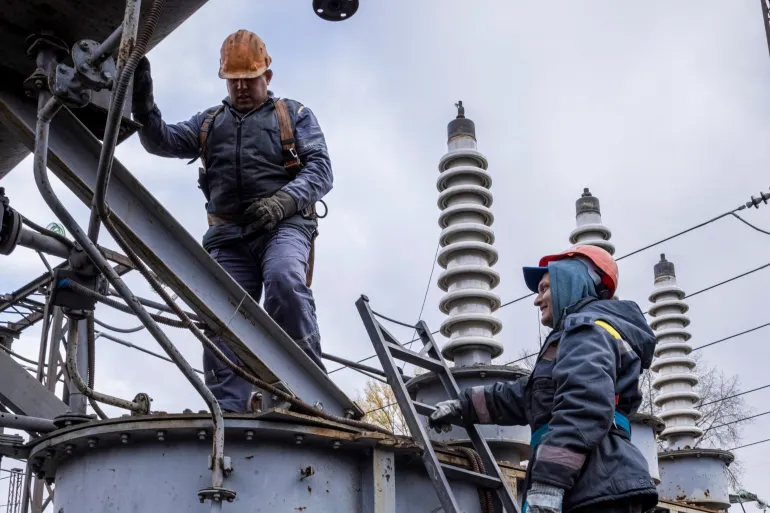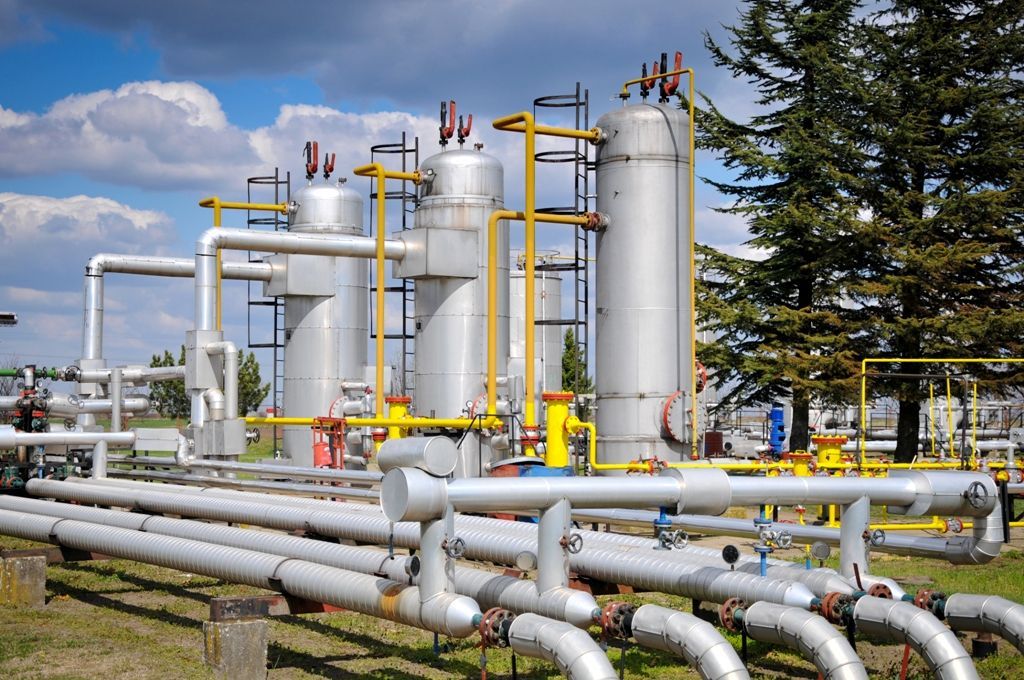Restoration of Ukrainian Energy Sector Will Cost Tens of Billions of Euros
2. apríla 2025
Various aspects of the ongoing conflict in Ukraine are the subject of many discussions at virtually all levels of society. From a business perspective, however, we will try to focus on objective facts.

According to a report by the International Energy Agency (IEA), Ukraine lost more than 9 GW of electrical energy production capacity in the period from March to May of this year alone. Compared to the state before 2022, only about a third of Ukraine's energy infrastructure was in functional condition in the first half of 2024. "More than half of the high-voltage substations managed by the Ukrainian state enterprise UKRENERGO are damaged, and an acute shortage of spare parts makes their timely repair practically impossible. The IEA estimates the cost of restoring Ukraine's energy infrastructure at more than $30 billion," states Matúš Šársky, Director of International Relations at Eximbanka, in the final installment of the HN series "I Want to Be an Exporter."
According to him, stabilizing the Ukrainian transmission system and ensuring the availability of electricity is one of the key prerequisites not only for further recovery of the Ukrainian economy but also for creating basic conditions for the life of residents and economic activities of business entities in Ukraine even during the ongoing conflict.
Stability is the Priority
Security and energy stability are not only a priority for Ukraine but also for the European Union. These priorities are of strategic importance for EU countries in the immediate neighborhood of Ukraine. This includes Slovakia, which is already implementing specific steps in cooperation with Ukrainian partners in this regard. This mainly involves the modernization and capacity increase of the transmission system between Slovakia and Ukraine through the construction of a new connection in the Veľké Kapušany – Mukachevo section.
For this project to bring the expected results, it is necessary to carry out work on critical energy infrastructure on the Ukrainian side as well. "The implementation of complex projects of design, construction, and modernization of the energy system in the western part of Ukraine represents an opportunity that Eximbanka, in cooperation with partners, wants to mediate to Slovak companies as well," Šársky explains to HN.
According to him, the strategic advantage of Slovak companies is their knowledge of local Ukrainian partners, the environment, and related specifics. Slovak companies still employ a strong generation of top experts who gained experience, among other things, in the generation and transmission system in Ukraine. For their counterparts there, they are equal partners with excellent knowledge of the issues and needs of the Ukrainian energy market, and last but not least, with good language skills.
Proximity to Transcarpathia
Moreover, Slovakia has an exceptional position vis-à-vis Ukraine, especially its western part, namely Transcarpathia, defined by cultural and historical proximity, as well as the potential for developing mutual connections or Transcarpathia itself, into which financial and human capital is currently flowing from the entire country.
From a business perspective, the current situation in Ukraine needs to be perceived as highly risky due to commercial and political risks. Both these types of risks share a common denominator – the possibility of non-payment for delivered goods and services due to the insolvency or unwillingness of the customer on the Ukrainian side. "The probability of such a scenario can be very high, especially given the unpredictability of further development of the conflict and the related poor economic situation of Ukrainian entities that cannot perform their activities in a standard regime," says Šársky.
According to him, investments and business transactions into a country within which a conflict is taking place are unfeasible under commercial conditions in standard business practice. Commercial and even state and development financial institutions have only a very limited appetite for carrying out operations in the Ukrainian market in the current situation.
In the case of Ukraine, an unprecedented situation is occurring – the international community and states are making coordinated efforts to mobilize investments and financial operations in the interest of supporting and stabilizing the country. However, the resources of institutional and state budgets are insufficient to cover the massive investment needs. "One of the solutions is therefore the mobilization of additional investments from the resources of financial institutions and private capital through guarantee and grant schemes and instruments financed from the resources of institutional and state budgets," adds Šársky.
Source: “Obnova ukrajinskej energetiky bude stáť desiatky miliárd eur.” Eximbanka.sk, December 18, 2024. https://eximbanka.sk/obnova-ukrajinskej-energetiky-bude-stat-desiatky-miliard-eur/ . Accessed: 31. 3. 2025
According to him, stabilizing the Ukrainian transmission system and ensuring the availability of electricity is one of the key prerequisites not only for further recovery of the Ukrainian economy but also for creating basic conditions for the life of residents and economic activities of business entities in Ukraine even during the ongoing conflict.
Stability is the Priority
Security and energy stability are not only a priority for Ukraine but also for the European Union. These priorities are of strategic importance for EU countries in the immediate neighborhood of Ukraine. This includes Slovakia, which is already implementing specific steps in cooperation with Ukrainian partners in this regard. This mainly involves the modernization and capacity increase of the transmission system between Slovakia and Ukraine through the construction of a new connection in the Veľké Kapušany – Mukachevo section.
For this project to bring the expected results, it is necessary to carry out work on critical energy infrastructure on the Ukrainian side as well. "The implementation of complex projects of design, construction, and modernization of the energy system in the western part of Ukraine represents an opportunity that Eximbanka, in cooperation with partners, wants to mediate to Slovak companies as well," Šársky explains to HN.
According to him, the strategic advantage of Slovak companies is their knowledge of local Ukrainian partners, the environment, and related specifics. Slovak companies still employ a strong generation of top experts who gained experience, among other things, in the generation and transmission system in Ukraine. For their counterparts there, they are equal partners with excellent knowledge of the issues and needs of the Ukrainian energy market, and last but not least, with good language skills.
Proximity to Transcarpathia
Moreover, Slovakia has an exceptional position vis-à-vis Ukraine, especially its western part, namely Transcarpathia, defined by cultural and historical proximity, as well as the potential for developing mutual connections or Transcarpathia itself, into which financial and human capital is currently flowing from the entire country.
From a business perspective, the current situation in Ukraine needs to be perceived as highly risky due to commercial and political risks. Both these types of risks share a common denominator – the possibility of non-payment for delivered goods and services due to the insolvency or unwillingness of the customer on the Ukrainian side. "The probability of such a scenario can be very high, especially given the unpredictability of further development of the conflict and the related poor economic situation of Ukrainian entities that cannot perform their activities in a standard regime," says Šársky.
According to him, investments and business transactions into a country within which a conflict is taking place are unfeasible under commercial conditions in standard business practice. Commercial and even state and development financial institutions have only a very limited appetite for carrying out operations in the Ukrainian market in the current situation.
In the case of Ukraine, an unprecedented situation is occurring – the international community and states are making coordinated efforts to mobilize investments and financial operations in the interest of supporting and stabilizing the country. However, the resources of institutional and state budgets are insufficient to cover the massive investment needs. "One of the solutions is therefore the mobilization of additional investments from the resources of financial institutions and private capital through guarantee and grant schemes and instruments financed from the resources of institutional and state budgets," adds Šársky.
Source: “Obnova ukrajinskej energetiky bude stáť desiatky miliárd eur.” Eximbanka.sk, December 18, 2024. https://eximbanka.sk/obnova-ukrajinskej-energetiky-bude-stat-desiatky-miliard-eur/ . Accessed: 31. 3. 2025

The year 2025 was, from the perspective of critical infrastructure, a year of legislative transformation. The year 2026 is the first year of its full-scale application. The difference between these two periods is fundamental – while 2025 was dominated by legal implementation and methodological preparation, 2026 brings a regime of real regulatory responsibility.

Rok 2025 bol z pohľadu kritickej infraštruktúry rokom legislatívnej transformácie. Rok 2026 je prvým rokom jej plnohodnotnej aplikácie. Rozdiel medzi týmito dvoma obdobiami je zásadný – zatiaľ čo v roku 2025 dominovala právna implementácia a metodická príprava, v roku 2026 nastupuje režim reálnej regulačnej zodpovednosti.

New legislative amendments in the area of critical infrastructure in the form of the Critical Infrastructure Act, which came into effect on January 1, 2025, bring new requirements for critical entities regarding risk management, ensuring essential services, and increasing the resilience of critical infrastructure.





